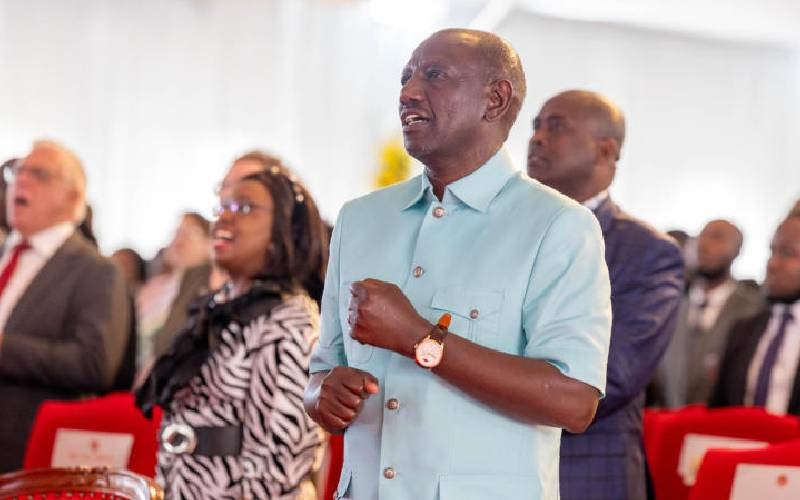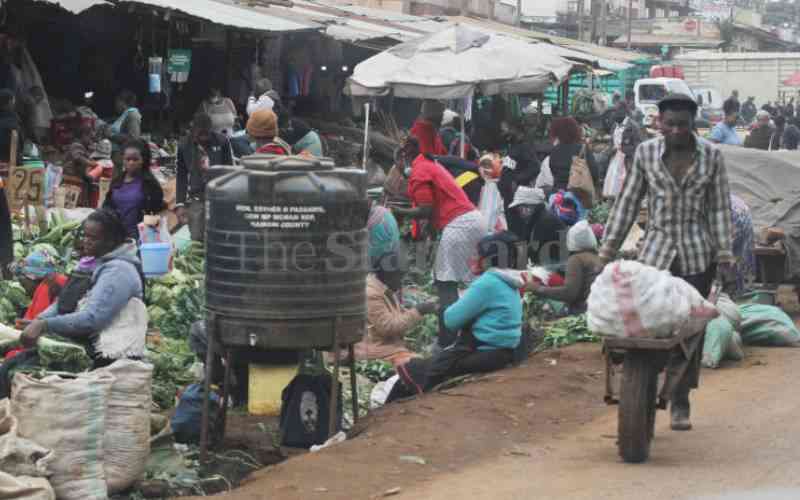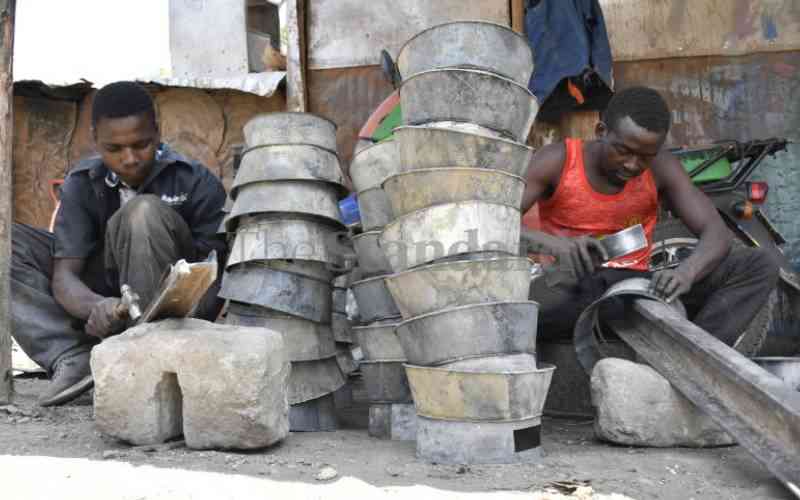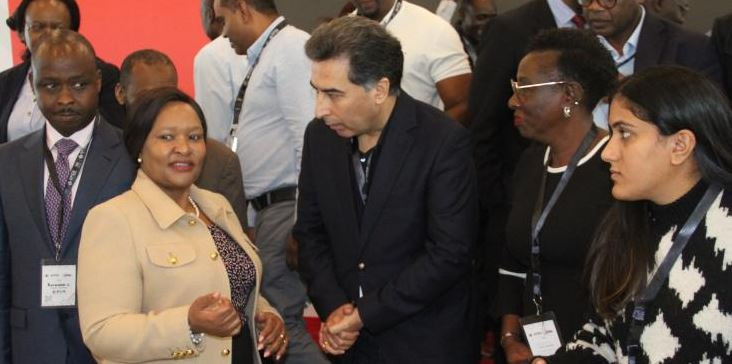
Last year, Kenyans were waiting for the Independent Electoral and Boundaries Commission (IEBC) Chairman Wafula Chebukati to declare one of the top candidates as the winner of the 2022 presidential election.
The country had gone to the polls five days earlier, on August 9, and expectations were high.
When William Ruto, the then Kenya Kwanza candidate, was declared winner on August 15, it set the stage for the implementation of his 'hustler' economic agenda.
What has now come to be referred to as the Bottom Up Economic Transformation Agenda (Beta) had during the campaign season been marketed as a framework that would be friendly to the common man (hustler) - the micro, small and medium entrepreneurs.
As time unfolds, the government is showing the stuff that the economic model is made up of.
And to an extent, the administration has lived up to its word. On November, 30 last year, President Ruto launched the Hustler Fund, living up to his promise of putting in place a kitty that would offer small businesses cheaper credit.
Access to credit has over the years been among the factors that have hindered the growth of SMEs in the country, with the available options having been expensive and predatory loans by commercial banks and even loan sharks. The Hustler Fund, which has recently started lending to businesses, was a welcome move.
As of last month, the kitty had disbursed Sh33 billion to Kenyans in personal loans. At the same time, the government has been working with other lenders to give a break to borrowers who had been negatively listed with Credit Reference Bureaus (CRBs) and also lowering the cost of credit offered by mobile lenders.
Dr Ruto's administration also pumped billions of shillings into the fertiliser subsidy programme which was expected to help boost agricultural production and effectively deal with the high cost of living.
While there are controversies as to whether the Hustler Fund loans are sinking Kenyans deeper into mobile debt, with many of the borrowers being consistently in debt or even whether the subsidised fertiliser has had any impact on agriculture - since the cost of food items still remains high, the Kenya Kwanza regime can brag on keeping some of its promises to the hustler.
The list of kept promises is however shy when pitted against the many promises that the new administration has broken. When looked at from a certain angle, it could look like the Kenya Kwanza administration has reneged on its promise of taming the high cost of living. Not only that but also appears to be working hard to make life even more difficult for the hustlers that it had endeared itself to during the campaigns.
Immediately Dr Ruto took over as president on September 13 last year, he did away with the subsidy on super petrol. The government would later in May this year remove subsidies on diesel and kerosene. The two fuels are key to the economy, with diesel used in powering many sectors such as transport, manufacturing and power production while Kerosene is used for lighting and cooking by many economically vulnerable Kenyans.

While the administration has rightly argued against subsidising consumption goods such as food and fuel, it moved ahead to impose more taxes on fuel. Through the Finance Act 2023, the State increased value-added tax (VAT) on petroleum products to 16 per cent from eight per cent, resulting in pump prices hitting record highs in July.
Higher taxes
While analysts agree that subsidies are unsustainable, they argue that the higher taxes might hurt an economy that is yet to recover from the shocks of Covid-19 and the prolonged drought.
The Finance Act is expected to enable the government to increase tax revenues and finance the Sh3.6 trillion budget over the current financial year, with expectations that it helps the taxman raise an additional Sh289 billion this financial year.
Other than increasing the cost of fuel, the Finance Act 2023 has also resulted in reduced take-home pay for Kenyans employed in the formal sector through different measures including the affordable housing levy and the higher taxes for high-income earners.
The Act has also increased taxes for the very small businesses that pay turnover tax to three per cent from one per cent. This is even as the Act had the effect of moving SMEs earning over Sh25 million per year to the corporate tax band, which analysts note would make them pay higher tax rates of 30 per cent on their income but also make it more expensive and difficult to become tax compliant.
Analysts note that these measures could have the unintended effect of reducing consumption and in turn the taxes that Kenya Revenue Authority might collect over the 2023/24 financial year.
David Wanjohi, a senior tax manager at Ernst and Young (EY) said higher tax rates might not necessarily have the desired impact of increasing tax revenues.
"KRA might be able to collect more from a direct tax perspective but from an indirect tax perspective there will be less money to spend (among Kenyans) as they grapple with reduced disposable income and there may be a dip in terms of collection from an indirect tax perspective," said Wanjohi in a recent interview with The Standard.
"People will inevitably look for alternatives... whereas you would think there would be the same economic activity, for example in the transport sector, people who would take matatus might now opt to walk to work, if there were two vehicles in a household, they will probably use one."
In hiking the VAT rate on fuel, the government had noted that there was the need to standardise the VAT rate, with all other vatable products paying a rate of 16 per cent while petroleum was at eight per cent. It noted that the "effect of the differential VAT on fuel led to petroleum distributors being in a constant credit position, thus leading to high expenditure for the government".
High-income earners will be hit by higher Pay as You Earn (PAYE), which will, starting September, go up to 35 per cent for Kenyans earning upwards of Sh800,000 per month from 30 per cent. Those earning between Sh500,000 and Sh800,000 will be taxed at 32.5 per cent.

The Act has also increased advance tax paid by public service and commercial vehicles. The advance tax for passenger vehicles will increase to either Sh100 per passenger per month or Sh5,000 per year, whichever is higher, from a rate of Sh60 per passenger or Sh2,400 per year.
Advance tax for cargo vehicles will double to Sh3,000 per tonne per year or Sh5,000 per year, whichever is higher, from the current rates of Sh1,500 and Sh2,400 per year. Advance tax is paid by owners of commercial vehicles and includes passenger vehicles such as matatus, taxis and tour vans as well as cargo vehicles such as pick-ups, lorries, prime movers, trucks and trailers.
"There is a huge increase in advance tax for the matatus and other players in the transport business... again, the question of whether we are encouraging the hustlers or doing injustice to them comes to mind," said Alex Kanyi, Partner in the Tax & Exchange Control at Cliffe Dekker Hofmeyr (CDH). "This will be painful because we have to discuss it within the context of the increase in VAT on fuel. Transporters - whether of cargo or passengers - are the hardest hit by the higher cost of petroleum products."
Lowering the cost of living was one of the issues that President William Ruto rode to power on, promising to ease the suffering of Kenyans while harshly criticising his boss at the time President Uhuru Kenyatta. "We are forming a government that will turn around the economy and put money in the pocket of the common mwananchi," said Ruto before elections last year.
"Do you know why these people have let the price of maize flour go up? It is because they have never slept on an empty stomach. Even as we speak of the price of flour, they do not understand what we are talking about," he said on the campaign trail last year, referring to then-President Uhuru Kenyatta and his preferred candidate Azimio's Raila Odinga.
The cost of living has however remained high. Plans to bring in thousands of tonnes of maize, wheat, cooking oil and other essentials to ease high prices using the State-owned Kenya National Trading Corporation appear not to have yielded much. One year on inflation in July dropped to 7.3 per cent, coming within the government's preferred range of between 2.5 per cent and 7.5 per cent for the first time in more than a year.
While prices of certain food items including vegetables have dropped, this has largely been due to the recent rains.
The cost of sugar, maize flour and bread, staples on many breakfast and dinner tables in the country, has remained high. A two-kilogramme packet of maize flour is retailing at over Sh200, the same as was the case last year when the new administration was taking over.
The cost of bread has recently increased to about Sh65 for a 400-gram loaf. The latest spike is attributed to sugar prices that have doubled.
President Ruto has since said the cost of living and the other challenges that Kenyans face cannot be sorted out overnight and that "there are no miracles" and that this has to be done "systematically".
In June this year, Ruto said the cost of living keeps him up at night. "The cost of living is keeping all leaders, including myself, awake and this is precisely as it should be," he said.
The high cost of living is among the things that drove Kenyans to demonstrate on the streets in recent months.
 The Standard Group Plc is a multi-media organization with investments in media platforms spanning newspaper print
operations, television, radio broadcasting, digital and online services. The Standard Group is recognized as a
leading multi-media house in Kenya with a key influence in matters of national and international interest.
The Standard Group Plc is a multi-media organization with investments in media platforms spanning newspaper print
operations, television, radio broadcasting, digital and online services. The Standard Group is recognized as a
leading multi-media house in Kenya with a key influence in matters of national and international interest.











